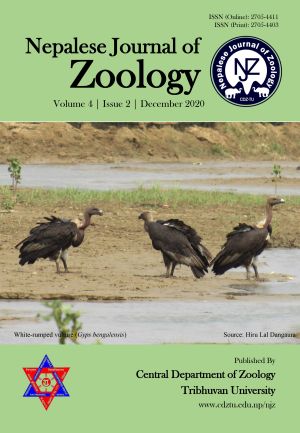Understanding bats as a host of different viruses and Nepal's vulnerability on bat viruses
DOI:
https://doi.org/10.3126/njz.v4i2.33899Keywords:
Bat virus, Bushmeat, COVID-19, Nepal, ZoonoticAbstract
Bats maintain and transmit many viruses (Filoviruses, Rubulaviruses, Henipaviruses, Lyssaviruses, and Coronaviruses etc.); most of them are pathogenic to human but bats act as reservoir host without causing any pathogenesis. Coronavirus disease-2019 (COVID-19) pandemic is a twenty-first-century awakening for the human world that signifies the zoonotic viral challenge. Bats fauna are suspected to originate viral outbreaks through solid evidence that is lacking worldwide. The bats like Pteropus giganteus, Rousettus leschenaultii, Eonycteris spealea, Rhinolophus sinicus, R. affinis, R. ferremequinum, Nyctalus noctula, and Scotophillus sp. are reported for viral evidence that are also extended to Nepal's geography. Bats bush-meat culture persist in Chepang community of Nepal indicates a high risk of a zoonotic viral outbreak in the future. Though Nepal has no evidence of any viral outbreak until the COVID-19 pandemic situation, precaution is warned for bat conservation and bat roost management to ensure bat virus safety.
Downloads
Downloads
Published
How to Cite
Issue
Section
License
This license enables reusers to distribute, remix, adapt, and build upon the material in any medium or format for noncommercial purposes only, and only so long as attribution is given to the creator.

